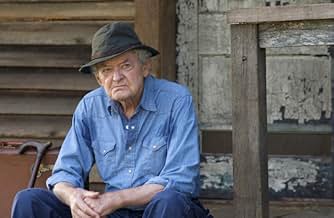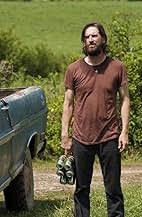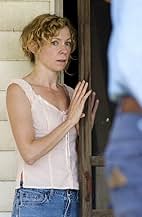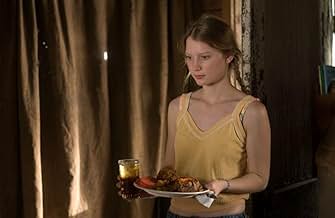CALIFICACIÓN DE IMDb
7.0/10
3.1 k
TU CALIFICACIÓN
Agrega una trama en tu idiomaAn aging Tennessee farmer returns to his homestead and must confront a family betrayal, the reappearance of an old enemy, and the loss of his farm.An aging Tennessee farmer returns to his homestead and must confront a family betrayal, the reappearance of an old enemy, and the loss of his farm.An aging Tennessee farmer returns to his homestead and must confront a family betrayal, the reappearance of an old enemy, and the loss of his farm.
- Premios
- 11 premios ganados y 4 nominaciones en total
Brian Edward Keith
- Deputy Keith
- (sin créditos)
William J. Mode
- Deputy Davies
- (sin créditos)
- Dirección
- Guionistas
- Todo el elenco y el equipo
- Producción, taquilla y más en IMDbPro
Opiniones destacadas
Scott Teems wrote and directed this touching movie called " That Evening Sun. " It's tells the story of an aging Tennessee farmer, Abner Meecham (Hal Holbrook) who was accidentally injured at home and put into a convalescent home. Unfortunately for him, Abner awoke to learn his son Paul (Walton Groggins) had committed him to this home for the duration of his life. Refusing to stay, he returns to his farm where Meecham discovers his family farm has been leased out to an old adversary Lonzo Choat (Ray McKinnon) who tries to drive him off the disputed farm. Because of the law, the two now face an unresolved issue which is complicated by the alcoholic owner and his frightened family. The story is dramatically poignant and with the characters including the dog, bonding closely, becomes sentimentally lasting. Barry Corbin plays next door neighbor Thurl Chessor and becomes a credit to the overall story. ***
An aging Tennessee farmer returns to his homestead and must confront a family betrayal, the reappearance of an old enemy, and the loss of his farm.
This is the perfect example of how to write an old bull can against the young bull one. Holebrook's character doesn't want trouble, just his pride and the right to go on living the way he once did. He doesn't have much left, but pride. The movie does a great job of making us care for Holebrook, something that was hard to pull off consistently. Hal Holebrook is magnificent, and Oscar worthy here in his portrayal of Abner Meecham. It was hard to pull off, but Holebrook manages to maintain likability along with his grouchy, potentially off-putting role. There's never a moment where we don't sympathize with him, even when he pushes the limits, we manage to emphasize with his actions. I've not seen Holebrook perform a better role than this one. Ray McKinnon is excellent as the hot-shot antagonist, wanting to take over the farm. You'll hate him, and possibly even understand his actions in some cases. Walter Goggins is very good as the ungrateful son of Holebrook's, he did well.
Bottom line. The Sundance Film Festival struck gold with this one, and you will too. A must see
9 ½ 10
This is the perfect example of how to write an old bull can against the young bull one. Holebrook's character doesn't want trouble, just his pride and the right to go on living the way he once did. He doesn't have much left, but pride. The movie does a great job of making us care for Holebrook, something that was hard to pull off consistently. Hal Holebrook is magnificent, and Oscar worthy here in his portrayal of Abner Meecham. It was hard to pull off, but Holebrook manages to maintain likability along with his grouchy, potentially off-putting role. There's never a moment where we don't sympathize with him, even when he pushes the limits, we manage to emphasize with his actions. I've not seen Holebrook perform a better role than this one. Ray McKinnon is excellent as the hot-shot antagonist, wanting to take over the farm. You'll hate him, and possibly even understand his actions in some cases. Walter Goggins is very good as the ungrateful son of Holebrook's, he did well.
Bottom line. The Sundance Film Festival struck gold with this one, and you will too. A must see
9 ½ 10
Based on the short story "I Hate to See That Evening Sun Go Down" by William Gay, "That Evening Sun" presents us with an epic battle of wills between two equally immutable forces fighting over the same piece of land. The property in question is a rundown farm in rural Tennessee owned by Abner Meecham (Hal Holbrooke), an octogenarian who's just walked away from the retirement home his son (Walter Goggins) placed him in after a serious fall a few months back. When Abner gets back to his farm, he is stunned to find that - thanks to a deal brokered by his lawyer son – the place has been signed over to a white-trash, ne'er-do-well by the name of Lonzo Choat (Ray McKinnon), who now lives there with his wife (Carrie Preston) and sixteen-year-old daughter (Mia Wasikowska), with whom Abner establishes an uneasy but generally tender relationship.
Scott Teem's screenplay is multi-faceted and complex in the way it develops its characters. For instance, many of the very same qualities that make Abner so appealing to the audience – his tenacity, his commitment to principle, his uncompromising willingness to call things as he sees them – are also what make him a hard person to deal with for those who are actually a part of his life. This is especially the case with his son, who though he obviously loves his father and wants to do right by him, harbors a lifelong resentment against the old man for his harsh treatment of both himself and his now-deceased mother while he was growing up.
To a somewhat lesser extent, Lonzo is also portrayed in a three-dimensional light. Though he is an alcoholic, a wastrel, and a man prone to acts of violence against both animals and members of his own family, there is a sense that he is genuinely trying to get his life together by earning an honest living and finally being a decent provider for his loved ones.
The movie really seems to understand the tragedy of old age – of feeling as if everything you ever called your own is now being taken away from you and nobody around you seems to care. In fact, many of those people – despite, in some cases, their possible good intentions - are proactively involved in bringing that outcome about. The movie also touches upon that root and highly American value of property ownership, and the willingness to stop at virtually nothing to ensure one's hold on one's land.
"That Evening Sun" is what is called in the trade an "actors' picture," and, indeed, it is the performances that are of primary interest here. Holbrooke has always been a tremendous actor, but here he is positively transcendent as Abner, a crusty old coot who is so much more than just a crusty old coot. Goggins, the brilliant star of "The Shield" and "Justified" and a co-producer of this film, is also excellent as Paul Meecham, a role quite different from the ones in the aforementioned works. And McKinnon, Preston ("True Blood"), and Wasikowska ("Alice in Wonderland," "The Kids are All Right") are all wonderful as well.
The tone of the film is contemplative and muted, and Teems' direction is rich in atmosphere and setting.
Scott Teem's screenplay is multi-faceted and complex in the way it develops its characters. For instance, many of the very same qualities that make Abner so appealing to the audience – his tenacity, his commitment to principle, his uncompromising willingness to call things as he sees them – are also what make him a hard person to deal with for those who are actually a part of his life. This is especially the case with his son, who though he obviously loves his father and wants to do right by him, harbors a lifelong resentment against the old man for his harsh treatment of both himself and his now-deceased mother while he was growing up.
To a somewhat lesser extent, Lonzo is also portrayed in a three-dimensional light. Though he is an alcoholic, a wastrel, and a man prone to acts of violence against both animals and members of his own family, there is a sense that he is genuinely trying to get his life together by earning an honest living and finally being a decent provider for his loved ones.
The movie really seems to understand the tragedy of old age – of feeling as if everything you ever called your own is now being taken away from you and nobody around you seems to care. In fact, many of those people – despite, in some cases, their possible good intentions - are proactively involved in bringing that outcome about. The movie also touches upon that root and highly American value of property ownership, and the willingness to stop at virtually nothing to ensure one's hold on one's land.
"That Evening Sun" is what is called in the trade an "actors' picture," and, indeed, it is the performances that are of primary interest here. Holbrooke has always been a tremendous actor, but here he is positively transcendent as Abner, a crusty old coot who is so much more than just a crusty old coot. Goggins, the brilliant star of "The Shield" and "Justified" and a co-producer of this film, is also excellent as Paul Meecham, a role quite different from the ones in the aforementioned works. And McKinnon, Preston ("True Blood"), and Wasikowska ("Alice in Wonderland," "The Kids are All Right") are all wonderful as well.
The tone of the film is contemplative and muted, and Teems' direction is rich in atmosphere and setting.
I've been looking forward to "That Evening Sun" for a while now, and not just because it was shot in the county and surrounding towns where I live here in Tennessee.
My anticipation was largely because of Hal Holbrook, an iconic performer I have seen in his one-man "Mark Twain Tonight!" stage show, and who appears in occasional guest shots on TV where things must move very fast, and less often in film, where things are allowed to proceed at a more measured pace.
I was not disappointed, the character study of Abner Meechum, the refugee from an old folks' home and renegade on his own property is rich, complex, and satisfying throughout. Admittedly it may not be a big stretch for Holbrook to play a cranky 80-year-old, but that doesn't lessen the impact of the performance at all.
Surrounding him is a cast of surprisingly strong players: the antagonist Lonzo Choat (Ray McKinnon) is an especially worthy and believable opponent, and supporting cast Pamela and Ludie Choat (Mia Wasikowska and Carrie Preston) likewise hit just the right notes, tugging this farm county family drama at precisely the right pace. I especially enjoyed Barry Corkin, perfect in the Wilfred Brimley-esquire good neighbor role, and a special mention for the cameo by Dixie Carter, Hal Holbrook's wife in the movie as well as in real life.
Where I saw the film, at a packed 1pm matinée, the audience laughed at several of the moments, self-reflective as they were of Tennessee rural life. I don't know that they would garner that kind of introspective appreciation in other parts of the country, but here, people know their country folk and can laugh with, rather than at them.
"That Evening Sun" is a simple yarn: Abner tires of life in a retirement home and returns to the farm he and his deceased wife occupied for most of their lives, only to find it occupied by a neer-do-well, but one with a property lease Abner's "guardian son" has approved. The story is more than the tug-of-war between owner and lessor, it is between hard-working- older and layabout younger, and between lives at noon and the sundown that inevitably follows. Taken from William Gay's short stories of Southern life, "I Hate To See That Evening Sun Go Down," it's the unraveling of a proud man in the twilight, as his own sun is setting, and his fight with the oncoming night.
Hal Holbrook is a treasure. So is this film. It's Indie with a capital "I", an armful of festival awards, and, one hopes, a long run ahead.
My anticipation was largely because of Hal Holbrook, an iconic performer I have seen in his one-man "Mark Twain Tonight!" stage show, and who appears in occasional guest shots on TV where things must move very fast, and less often in film, where things are allowed to proceed at a more measured pace.
I was not disappointed, the character study of Abner Meechum, the refugee from an old folks' home and renegade on his own property is rich, complex, and satisfying throughout. Admittedly it may not be a big stretch for Holbrook to play a cranky 80-year-old, but that doesn't lessen the impact of the performance at all.
Surrounding him is a cast of surprisingly strong players: the antagonist Lonzo Choat (Ray McKinnon) is an especially worthy and believable opponent, and supporting cast Pamela and Ludie Choat (Mia Wasikowska and Carrie Preston) likewise hit just the right notes, tugging this farm county family drama at precisely the right pace. I especially enjoyed Barry Corkin, perfect in the Wilfred Brimley-esquire good neighbor role, and a special mention for the cameo by Dixie Carter, Hal Holbrook's wife in the movie as well as in real life.
Where I saw the film, at a packed 1pm matinée, the audience laughed at several of the moments, self-reflective as they were of Tennessee rural life. I don't know that they would garner that kind of introspective appreciation in other parts of the country, but here, people know their country folk and can laugh with, rather than at them.
"That Evening Sun" is a simple yarn: Abner tires of life in a retirement home and returns to the farm he and his deceased wife occupied for most of their lives, only to find it occupied by a neer-do-well, but one with a property lease Abner's "guardian son" has approved. The story is more than the tug-of-war between owner and lessor, it is between hard-working- older and layabout younger, and between lives at noon and the sundown that inevitably follows. Taken from William Gay's short stories of Southern life, "I Hate To See That Evening Sun Go Down," it's the unraveling of a proud man in the twilight, as his own sun is setting, and his fight with the oncoming night.
Hal Holbrook is a treasure. So is this film. It's Indie with a capital "I", an armful of festival awards, and, one hopes, a long run ahead.
Abner Meecham,who has been living in a nursing home,is unhappy & wants to live out his final days on the farm land where he had made his living for over 50 years. One day,he packs his things & just walks away from it all. Despite a first failure (where he is picked up by the police & returned back to the home),Abner,undaunted tries again,this time getting further,with the help of a taxi cab driver,to his old farm land. Problem is,the land & the house are now leased by Lonzo Choat,who Abner doesn't like,one bit. Abner takes up in the workers quarters,just off the main house,much to the chagrin of Lonzo, who wants Abner off of his property,a.s.a.p. The following makes for a tense tale,that you know is going to end up badly. Scott Teem ('A Death In The Woods','Roots') directs & writes the screenplay,adapted from the novel, 'I Hate To See The Evening Sun Go Down',by William Gay (the title of which is taken from a line in an old country blues song by Jimmy Rogers). This is a quiet little independent film that in the wrong hands would have turned out to be just another Southern exploitation film (like the kind of films produced by Harry Novak that used to play drive in's back in the 1970's that stereotyped all of the citizens of the South as back woods,slack jawed,inbred,boozing,village idiots that would have sex with farm animals,or family members,or all of the above),but rises above that. The great Hal Holbrook (forever known for his portrayal of Mark Twain on stage & screen)plays Abner,a man who just wants what is rightly his. Ray McKinnon is Lonzo,a man who is just dripping with contempt for Abner. The rest of the cast (unknown by yours truly)turn in shining roles on screen. This is a quiet,little "indie" that drew acclaim at the festivals,but probably won't get much in the way of main steam distribution (I got to see it at one of our cinemas that specializes in foreign & art films),but deserves better. Rated PG-13 by the MPAA,it contains some raunchy language,an unpleasant scene of domestic abuse & some minor adult content.
¿Sabías que…?
- TriviaDixie Carter's final film appearance.
- Citas
Abner Meecham: Ha! Folks in hell will be eating Eskimo Pies before Lonzo Choat hauls me anywhere.
Selecciones populares
Inicia sesión para calificar y agrega a la lista de videos para obtener recomendaciones personalizadas
- How long is That Evening Sun?Con tecnología de Alexa
Detalles
- Fecha de lanzamiento
- País de origen
- Sitio oficial
- Idioma
- También se conoce como
- I Hate to See That Evening Sun Go Down
- Locaciones de filmación
- Productoras
- Ver más créditos de la compañía en IMDbPro
Taquilla
- Total en EE. UU. y Canadá
- USD 281,350
- Fin de semana de estreno en EE. UU. y Canadá
- USD 7,330
- 8 nov 2009
- Total a nivel mundial
- USD 281,350
- Tiempo de ejecución1 hora 49 minutos
- Color
- Mezcla de sonido
- Relación de aspecto
- 2.35 : 1
Contribuir a esta página
Sugiere una edición o agrega el contenido que falta

Principales brechas de datos
By what name was That Evening Sun (2009) officially released in India in English?
Responda






























